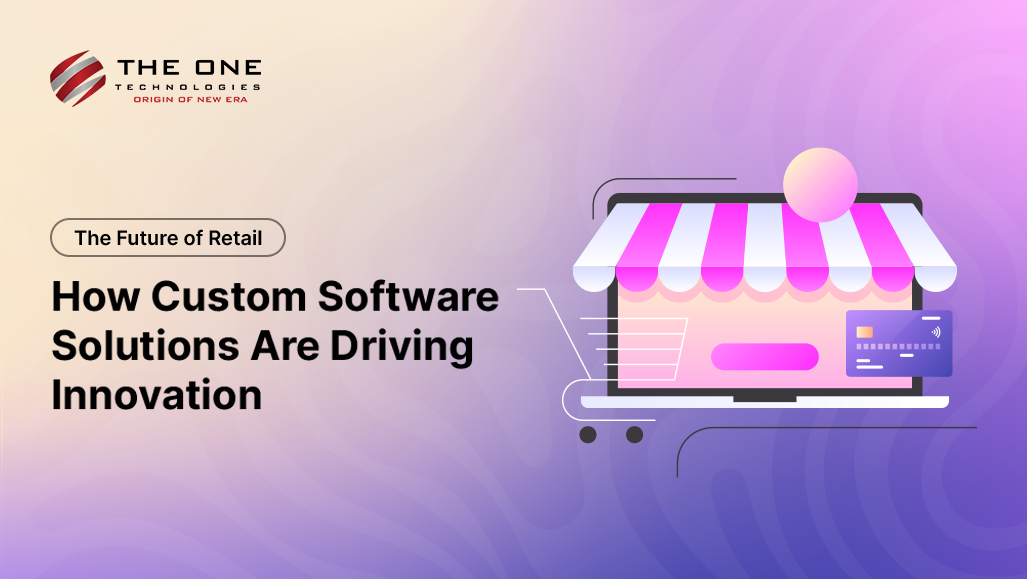How Custom Software Is Transforming the Industry

The decade has seen the retail industry go through a revolutionary change. E-commerce, mobile commerce, omnichannel retail, and changing consumer behaviors have rendered traditional models of retailing inadequate to remain competitive. Behind this revolution lies one such influential force, custom retail software solutions. Custom software, developed to meet the specific requirements of every retailer, not only enables retail innovation but also powers it.
The Retail Revolution: Why One-Size-Fits-All No Longer Works
The retail process isn't linear anymore. Consumers interact with brands through a range of channels, such as online, in-store, mobile apps, and social media. They expect real-time information, seamless transactions, immediate fulfilment, and customized experiences. Despite their potential utility for daily tasks, standard software packages fall short of such high standards.
Custom software development refers to solutions that are completely redesigned or significantly altered to satisfy the needs, objectives, and clientele of a retailer. Custom solutions are giving retailers the flexibility and scalability they need to expand and innovate, from point-of-sale (POS) interfaces and inventory management programmes to customer relationship management (CRM) software and recommendation engines driven by artificial intelligence (AI). Key Areas Where Custom Software Is Transforming Retail,
1. Personalized Customer Experiences
Customers of today long for customization. They want unified shopping across devices, pertinent promotions, and product recommendations based on their prior behavior. Customizable CRM software and AI-based analytics solutions are facilitating this.
For instance, customized recommendation engines scan user activity in real-time and dynamically change what is shown on a site or app. Personalized loyalty programs can be customized by user segments, spend levels, or engagement metrics. Such high-level personalization creates customer loyalty and generates higher conversions.
2. Efficient Inventory and Supply Chain Management
Stock problems, overstock or stockout can murder profits. Off-the-shelf inventory software does not have the sophisticated functionality required to maintain sophisticated supply chains or multi-location inventories.
Custom inventory management systems can be implemented to synchronize with specific vendor networks, offer real-time stock status, automate reordering on the basis of predictive analytics, and deliver SKU-level tracking. Not only does this minimize waste, but it also increases operational efficiency.
3. Omnichannel Integration
Merchants have to deliver a seamless customer experience among physical stores, websites, mobile apps, marketplaces, and social channels. Custom software closes the gaps among these channels.
A custom backend system can merge customer data, synchronize product catalogues between platforms, and ensure that promotions or loyalty rewards are seamless across the board. For instance, a customer might browse on the web, attempt in-store, and complete the purchase through an app. With one software foundation, the experience is seamless and uniform.
4. Smart Data and Analytics
Merchants are sitting atop data mountains but without the proper tools, it's nothing but noise. Tailored analytics platforms can be created to drill out useful insights from sales, customer, marketing, and inventory trends.
Whether it's determining slow sellers, maximizing marketing expenditures, or stocking the appropriate products at the right time, these technologies help retailers make better decisions. Retailers can outperform their rivals by using machine learning algorithms that can even predict trends based on historical performance.
5. Enhanced Customer Support
AI chatbots, real-time order tracking systems, and self-service portals are transforming customer support in retail. Custom software makes sure these tools fit exactly with a brand's tone, backend systems, and support workflows.
For example, a retailer-specific chatbot can be trained on the retailer's rules and product list, resulting in quicker and more precise resolutions. With order management systems integrated, customers can verify order status, initiate returns, or receive customized assistance without having to speak with a person.
Why Retailers Are Choosing Custom Software
- Scalability: As a business expands, custom solutions can be modified to meet growing demand or add new features.
- Flexibility: Unlike inflexible off-the-shelf platforms, custom software can adjust to shifting business requirements, technological advancements, and customer behavior.
- Competitive Edge: Customized solutions help retailers stand out in crowded markets by providing distinctive experiences.
- Security: Unlike generic platforms, custom-built platforms are able to give priority to security measures that are specific to the vulnerabilities of the business.
Challenges and Considerations
Of course, there are challenges with custom software. Upfront development costs may be higher, and implementation is time-consuming. But the long-term ROI via increased efficiency, customer retention, and innovation is usually many times greater than the initial cost.
Retailers also have to choose the correct development partner. One should have a team familiar with the retail business, user experience design, and integration of more than one system (ERP, payment gateways, logistics APIs, etc.).
Looking Ahead: What’s Next for Retail Innovation?
As technologies like AI, IoT, AR/VR, and blockchain mature, the possibilities for custom retail software are boundless:
- AR-powered virtual try-ons for fashion and cosmetics
- IoT-enabled smart shelves for real-time stock management
- Blockchain-based supply chain tracking for transparency and ethical sourcing
- Voice commerce integrations for smart home shopping experiences
In this fast-evolving environment, custom software development will continue to be the engine that fuels bold ideas and sustainable growth.
The Conclusion
In-store innovation is no longer a nicety, but a requirement. Tailored software solutions are proving to be the catalyst for real change as the business world fights to satisfy the demands of empowered, tech-savvy consumers. In addition to streamlining operations, retailers that invest in customized technology also provide customers with engaging experiences, cultivate customer loyalty, and position their company for success in a volatile economy.
Ready to innovate? Collaborate with The One Technologies a software company team and turn your retail vision into an energetic, technology-driven reality.



_638833365239103964.png)





